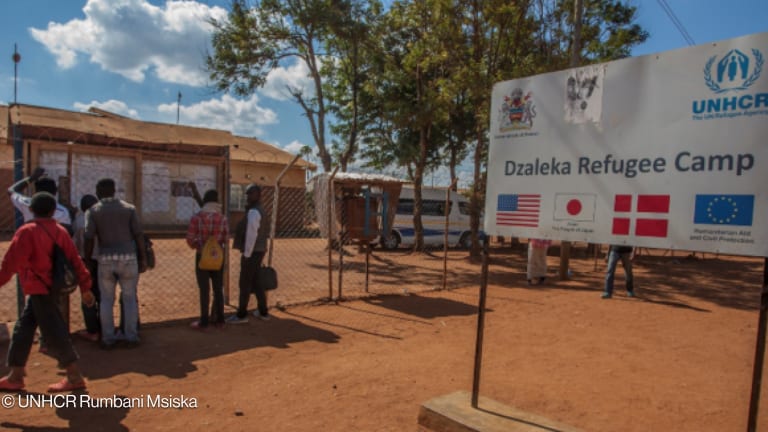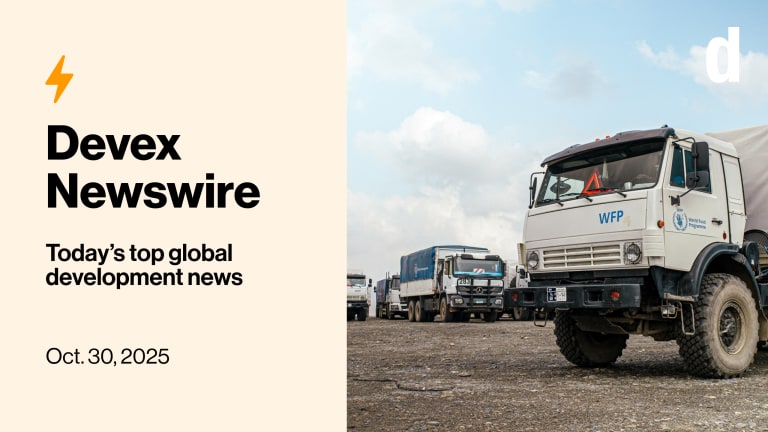
WASHINGTON — Two warring parties in South Sudan recently signed a ceasefire that was set to go into effect late last month, but like many previous such agreements, it fell apart before there was any opportunity for civilians to see benefits.
Since 2013, South Sudan has been immersed in a civil war that initially broke out over disagreements between President Salva Kiir and then-Vice President Reik Machar. Since then, millions of people have been driven from their homes trying to escape the violence, and thousands of civilians have been killed. Multiple internationally led efforts to stop the fighting have failed.
François Stamm, a Swiss national who previously managed the United States and Canadian delegations of the International Committee of the Red Cross, now oversees ICRC operations in South Sudan. His team includes 200 international mobile staff and around 800 South Sudanese staff, many of whom grew up in refugee camps in Uganda or Kenya.
Stamm sat down with Devex during a recent visit to Washington, D.C., to discuss the challenges ICRC faces working amidst the multitude of armed factions that have sprung up as the war has dragged on.
“Continued fighting means more suffering for the people of South Sudan and also makes it more difficult for the ICRC and other humanitarian agencies to provide much needed assistance and protection to those in need,” Stamm said of the ceasefire breakdown.
Stamm also explained how the organization’s history in the region provides it a strong security guarantee and uniquely positions ICRC to reach parts — and desperate civilians — of the poorly connected country that many other humanitarians cannot.
This conversation has been edited for length and clarity.
What impediment does the widespread violence pose to your ability to get care to the people who need it across a country with such poor infrastructure?
One hears a lot that it’s almost impossible to work in South Sudan. But I think one should also emphasize that not only ICRC, but almost every United Nations agency, or every major NGO like Médecins Sans Frontières, has one of their very largest operations in South Sudan.
“For me as head of [the ICRC] delegation in Juba, the most precious thing I must absolutely maintain is this reputation for independence, for neutrality.”
— François Stamm, head of the South Sudan ICRC delegationSo yes, the situation is difficult, there are impediments, there are obstacles, there are difficulties and there are challenges. But the truth — and that’s the good news — is there is still a lot that gets done.
For ICRC, we have good access in the country. This is built over 35 years of continuous presence. We’ve been present in this part of Africa for decades. Most South Sudanese stakeholders have met ICRC during those decades, be it at our hospital in Kenya, receiving food assistance, getting visited in prison. We have this track record, and for me as head of delegation in Juba, the most precious thing I must absolutely maintain is this reputation for independence, for neutrality. That allows ICRC to access places in South Sudan that virtually nobody else can access, because we have this recognition.
It’s not easy because there are still many obstacles, geography being one of them. Infrastructure is near nonexistent, flooding occurs in large part of the country for half of the year, it’s very difficult to move around. Security is an issue. You have to make sure that you have the security guarantee, you have to notify your movements, and it’s becoming increasingly difficult because the situation, especially on the side of the opposition, is increasingly fragmented. It multiplies the number of people we need to maintain contact with.
How do you make sure you maintain neutrality with all the fragmented groups?
It does complicate things, especially in the south of the country where the opposition has suffered losses militarily over the last year or so. They find it hard to control significant parts of the territory but they are still very present in the bush. They are more fragmented in smaller groups, probably because of the military pressure they are under. It’s more difficult for them to maintain cohesion, it’s more difficult for the leadership to pass clear instructions.
What South Sudan's increasingly fragmented war means for aid delivery
What many conflict analysts describe as an "alphabet soup of groups," is seen by some aid organizations as easier access to local communities. But others view the armed group fragmentation as a threat, grappling with how to deliver aid without exacerbating existing insecurity.
This could also be a cause for what we see as an increase of criminal activities, especially in Equatoria. People being robbed on roads; some NGO workers being kidnapped for brief periods of time. Control and command has never been great in South Sudan, to be candid, be it from the government or the opposition, but now, with this fragmentation, it’s becoming even more challenging.
The key condition, if you want to conduct operations, is to make sure you have your contacts on the ground. You don’t satisfy yourself with the green light coming from someone sitting in Nairobi when you are going to send a convoy in the Equatorias.
One additional factor that creates difficulties is the shutdown of the Vivacell mobile network. It was the main mobile phone network in the Equatorias, so it was very important. It means that many interlocutors have lost the main means of communication. They have to rely on satellite phones, which are very expensive. It affected many people across the political spectrum.
How do you serve the displaced population driven from their homes?
Protection of civilians is a big issue. You have the situations of the protection of civilian sites, about 220,000 people live in those sites. This is a problem in itself. Of course, they still need the protection but there’s also the fact that in those sites they receive health care, education for the children, nutrition. So it’s important to find an incentive for them to leave if they are OK in terms of protection. Otherwise, you might end up with a situation where they don’t need the protection but they will just end up staying because of the services they receive that they would not receive if they leave the site.
“Impunity is possibly the biggest problem, I think, in South Sudan. This is across the board.”
—The U.N. Mission in South Sudan is trying to find soft solutions to empty those sites, but to be candid it’s not been very successful so far and the figures remain rather stubborn. But that’s still only about 10 percent of the persons displaced in the country. We know that the fighters, the combatants do not behave according to the rules. There are many violations, and civilians suffer a lot from displacement, from harassment. Sexual violence is extremely high in terms of abuses against women and girls. We try to investigate and to make interventions with the responsible authorities, we also try to protect communities by our presence.
We also try, especially when it comes to sexual violence, to, for instance, help the communities with water projects — for instance drill a hole inside the village so that women don’t have to walk for miles and fetch water during which time they can be attacked. But it remains insufficient. Abuses are still there. Impunity is possibly the biggest problem I think in South Sudan. This is across the board.
The U.S. announced last month it is reviewing its aid to the South Sudan. What are your thoughts on this?
I think they want to make sure that none of the service vendors to the humanitarian community bend laws or this kind of thing, being affiliated to the wrong side or the wrong party. We’ve received very solid support from the U.S. government for many years. I think it’s only legitimate that the U.S. government would revisit its aid policy. Every donor has right to do this.
It’s also important in terms of accountability, people want to know where money is going. We’ve been very transparent as to how we use the money we receive. As far as ICRC is concerned, we’re confident that we have a really direct implementation of aid in South Sudan. I’ve been working in this business for 30 years, and there are few contexts where we have direct control until the beneficiaries. Which may be costlier sometimes, especially in South Sudan because you need the logistics apparatus, but at least you have control over the whole chain.
How does the protracted nature of the crisis impact the decisions you make in weighing what immediate needs must be cared for and how you can support the country longer term?
Sometimes, I feel that there is pressure on humanitarian assistance and agencies to lift South Sudan out of its current situation. Let me be clear: That’s not our role. It needs a political settlement, it needs a political solution. Humanitarian workers, humanitarian agencies can only do so much. Save lives. React to emergencies. But we are not going to take South Sudan out of its current predicament.
We try, in most of our activities, not only to do emergency — but still emergency is needed in this situation — but also to focus on resilience-building aspects of activities. For instance, with food assistance, 60-70 percent of the food distributed in South Sudan is dropped from the air. We complement this with seeds and tools, with fishing kits, we have a large program for cattle vaccination. Cattle is extremely important for large communities in South Sudan. It’s literally cash on legs. It’s not about nutrition, it’s really about wealth.
For health, we also have of course the flagship program, the spectacular program of emergency medical evacuation, of war surgery. We have four war surgery structures that we support, two in government-controlled areas and two in opposition controlled areas.
What other resilience-building activities do you support in South Sudan?
We also support 15-16 primary health care centers, which are very basic. They provide minimal care compared to Western standards but which are essential for South Sudanese as it’s basically their hospital. It is where they go if they have a difficult birth, if they are ill.
It’s important that we support those centers, especially with training. The strength of ICRC in South Sudan is a network, a presence. We are able to stay in the field, to maintain contact with the community. So it’s not just go in, go out, but we are really present there. I think that’s a big plus, that we can make sure that the assistance we provide is really received by the intended beneficiaries.
We also have urban water programs to help fight cholera. Again, this is not something ICRC should be doing. This is more for development agencies, but the big development agencies have left the country, the last ones during July 2016. Most of them have not come back, although the Japanese are on their way back.
It’s because In those protracted conflicts we’re increasingly confronted with development-like problems and challenges, but we’re very clear with our donors: We don’t want to turn ourselves into a development agency.








